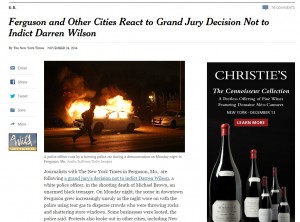You Should Care: Race and Ferguson
by Elisabeth Wilder – Horizon Guest Columnist
If you haven’t been near a computer, television, cellphone, or radio for the last week, allow me to catch you up to speed. Michael Brown, an unarmed black man was shot several months ago by Darren Wilson, a white police officer. Since the incident there has been controversy across the country over whether or not Michael Brown’s death was justifiable. The cries of anguish and anger have been primarily centered in Ferguson, Missouri where the event took place. Ever since the shooting the community has been in outrage over the event. Ultimately, the issue of whether or not officer Wilson should face charges was presented to a grand jury and it was decided last Monday: Officer Wilson will not be indicted.

Since the decision was made there have been anger, tears, protest, riots, heated Facebook posts, and bitter feelings from people all over the nation. Overall the decision has left the American people on all sides of the spectrum with one big question, was the death of Michael Brown an issue of race? Is this the story of a moral officer who was doing his duty or is it the story of an officer who racially profiled a man and discharged his weapon unnecessarily?
No matter what side of the story you believe, the answer is still clear, racism is still very prevalent and very much an issue in the United States. People don’t risk jail time and burn down buildings because a teenager they have never met was shot. Communities across a nation don’t rally behind an unknown officer because he was just doing his duty. A country doesn’t become engrossed in an issue over a handful of riots, peace vigils, and protests.
Citizens everywhere, both black and white, have taken interest in this issue for the same reason, race is on the line. The white community believes that they are being falsely accused of unnecessary violence, prejudice, and discrimination and the black community believes it is the target of unnecessary violence, prejudice, and discrimination. Both groups of people believe that there is injustice because of race.
While the evidence of what happened between Wilson and Brown matters greatly, the reality is that no one will ever know what exactly happened. Eyewitness testimony, which has been a primary source for this case, is the least reliable source of evidence there is. People get tunnel vision, miss important information under stress, forget things over time, and can fall under delusion under the power of suggestion. Memory is the reconstruction of events not a recording; therefore our memories are shaped largely by our own bias and preconceived ideas.
Whatever happened, the pain of racism has been felt. Whether you agree with the verdict of the grand jury or not, the death of Michael Brown is a call to be more proactive about destroying racism. Addressing the pain and hurt of racism begins with the acknowledgement that white privilege exists, that those who are white have more advantages than those who are not. White people like myself can go to the store, turn on the TV, or open a magazine and are represented in a positive way and with frequency. To be white is to be free from the weight of countless negative stereotypes, to hold the majority of power, and to carry a much lighter burden than those who are not white. White culture is the dominant culture that frequently tries to conform others to its ways.
Racism is not over, and anyone who believes differently is contributing to its harmful effects. White privilege shelters those who are white from the harsh realities that minorities face. One of racism’s greatest strengths is its ability to disguise itself as unintentional, inadvertent, or accidental. Our words and actions often induce stereotype threat, cause microagressions, and continually marginalize members of our society without our knowledge simply because we (white people) don’t understand, or don’t attempt to understand what it feels like not to be white.
Finally, the truth is that because of my white privilege I don’t have to be angry, terrified, or upset by what happened in Ferguson. The riots, the protests, and the verdict of the grand jury are all irrelevant to me, because at the end of the day everything is still the same for my race. At the end of the day, I don’t have to worry about how to properly interact with a police officer to avoid confirming a stereotype. I don’t have to turn on the TV and listen to people try to explain how it feels to be me or how I should act. My race, my white privilege, means I don’t have to be afraid of being shot just because I’m black.
Photo credit for headline photo: By The All-Nite Images from NY, NY, USA (Ferguson Protest, NYC 25th Nov 2014) [CC-BY-SA-2.0 (http://creativecommons.org/licenses/by-sa/2.0)], via Wikimedia Commons


